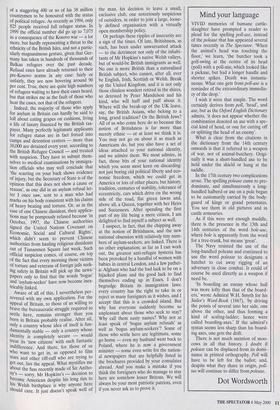Mind your language
VIVID memories of humane cattle- slaughter have prompted a reader to plead for the spelling poll-axe, instead of the poleaxe that has appeared several times recently in The Spectator. 'When the animal's head was touching the floor,' we learn, 'the butcher took a golf-swing at the centre of its head (poll) with a poll-axe, which looked like a pickaxe, but had a longer handle and shorter spikes. Death was instanta- neous. What one gets from poll-axe is a reminder of the extraordinary immedia- cy of the drop.'
I wish it were that simple. The word certainly derives from poll, 'head', and axe, but as the Oxford English Dictionary admits, 'it does not appear whether the combination denoted an axe with a spe- cial kind of head, or one for cutting off or splitting the head of an enemy'.
What is clear from the citations in the dictionary from the 14th century onwards is that it referred to a weapon of war, not of animal-butchery. Origi- nally it was a short-handled axe to be held under the shield or hung at the saddle.
In the 17th century two complications arose. The spelling poleaxe came to pre- dominate, and simultaneously a long- handled halberd or axe on a pole began to be customarily carried by the body- guard of kings or grand potentates. You see them in old pictures and in castle armouries.
As if this were not enough muddle, there is the presence in the 13th and 14th centuries of the word bole-axe, where bole is apparently from the word for a tree-trunk, but means 'great'.
The Navy resisted the use of the long-handled poleaxe and continued to use the word poleaxe to designate a hatchet to cut away rigging of an adversary in close combat. It could of course be used directly as a weapon if need be.
`In boarding an enemy whose hull was more lofty than that of the board- ers,' wrote Admiral W.H. Smyth for his Sailor's Word-Book (1867), 'by driving the points of several into her side, one above the other, and thus forming a kind of scaling-ladder; hence were called boarding-axes.' If the admiral's syntax seems less sharp than his board- ing axes, one gets the drift.
There is not much mention of moo- cows in all that history. I doubt if poleaxe can be displaced from its domi- nance in printed orthography. Poll will have to be left for the ballot; and, despite what they share in origin, poll- tax will continue to differ from poleaxe.
Dot Wordsworth


































































 Previous page
Previous page